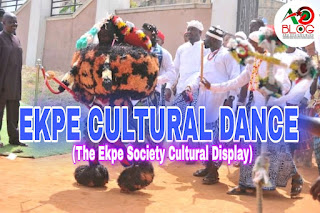Nigeria is renowned for its diverse cultures, which serve as the primary tourist attraction in Africa's most populous country. One of these vibrant cultures steeped in history is that of the Efik people, who inhabit the southern part of Cross River State, parts of Akwa Ibom, and extend across the Nigerian border into Cameroon.
The Efik economy was originally centered around fishing, but the region quickly evolved into a significant trading center, a status it maintained well into the early 20th century. From the 1800s, Christian missions were active among the Efik, who were reputed to be eager adopters of Western education in Nigeria.
By this time, many of the indigenous peoples were well-versed in European philosophies and culture, embraced Christianity, and adopted European dress. However, the Efik still maintained and proudly displayed their culture through architecture, festivals, and cuisine (notably, the Edikang Ikong and Afang vegetable soups are two famous culinary delights of the Efik).
One of the most significant aspects of unity among the Efik, which also gives them considerable influence, is the secret society known as the Ekpe. This society has been transformed into the Abakuá fraternity in Cuba, the Bonkó religion in Bioko, and the Abakuya dance in Equatorial Guinea.
During the recent Yuletide season, the ancient city of Calabar witnessed a remarkable Grand Ekpe ceremony reminiscent of bygone eras when Ekpe held sway. For many who have lived in the city for over forty years, it was a resurgence of forgotten sensory pleasures. For younger residents, it was a rare opportunity to catch a glimpse of the grandeur of the city their parents and grandparents often nostalgically spoke about.
Referred to by European ship captains, traders, and missionaries as "Grandy Egbo," this event was a unique and extraordinary spectacle. The festivities began on December 29 with the tolling of the Sabbath Egbo (Ekpe) Bell as a call to the community to gather for worship, praise, and thanksgiving at the Duke Town Presbyterian Church of Nigeria in Calabar.
This bell, which rang 170 years ago on Sunday, May 20, 1846, called all residents of Old Calabar to worship at the same church founded by Reverend Hope Masterton Waddell at the invitation of King Eyamba V, who sought to restore human dignity lost to centuries of slavery and slave trade, ushering in a new era of enlightenment.
The Ekpe ceremony also provided an opportunity for members of the King Eyamba and Duke Town families to celebrate the 100th birthday of their patriarch, His Royal Highness Etubom Okon Ekpenyong John Eyamba XVI, with pomp and circumstance on New Year's Day.
As part of the celebrations for the centenary of the man at the heart of the festivities, children and daughters of the realm were initiated into the Ekpe society, and a competition featuring Ekpe masks from different lodges was held.
The Efik are renowned for their rich masquerade tradition, with the most esteemed being the Ekpe mask, which historically served as the instrument of governance, enforcing social values and norms during the colonial era. The Ekpe society also played a significant role in the advancement of Christianity in the past, as the masquerade was used to ensure that members of the society attended church gatherings when necessary.
As members of the King Eyamba and Duke Town families celebrated their patriarch, they proudly showcased this aspect of their culture through various activities. Children and daughters of the Efik realm were initiated into their respective societies, and a parade was conducted to Bassey Duke's statue and other designated landmarks in the city, accompanied by a branch of the Ekpe group from Ugep Eburutu.
A day later, the ornate wall housing the sun circle, known in the local dialect as "Itiat Ekpe Efik Iboku," was unveiled, culminating in the grand finale—a competition featuring Ekpe masks from various Ekpe lodges.
The highlight of the celebrations was the Nyoro festival, initiated by King Eyamba V to honor and welcome the missionaries who arrived in Calabar in April 1846. In contemporary times, the Nyoro Ekpe festival is the climax of a series of events hosted by the revered Ekpe society, typically held during the Christmas and New Year holidays when Cross River indigenes and holidaymakers from around the world converge in Calabar.
Now a well-established event with high local participation, it inspired the now-famous Calabar Festival. Nyoro is a culturally and mentally significant event aimed at entertaining, enlightening, and uniting the Efik people. Through a series of intricate footwork, gestures, and body language known as "catwalk," which mimics the lion and the panther, participating Ekpe masks competed by showcasing their skill, expertise, understanding, and interpretation of what Ekpe represents before a panel of judges and an audience.
Based on their performance, scores are awarded, and a winner emerges. At the end of the competition, Ikoneto town emerged victorious, while Atakpa and Ugep Eburutu came in second and third place, respectively.
The Ekpe society in Arochukwu Community is revered as a symbol of cultural preservation and continuity, embodying the rich history and traditions of the Efik people. Its influence extends beyond the boundaries of Nigeria, showcasing the resilience and vibrancy of African cultures.


Post a Comment